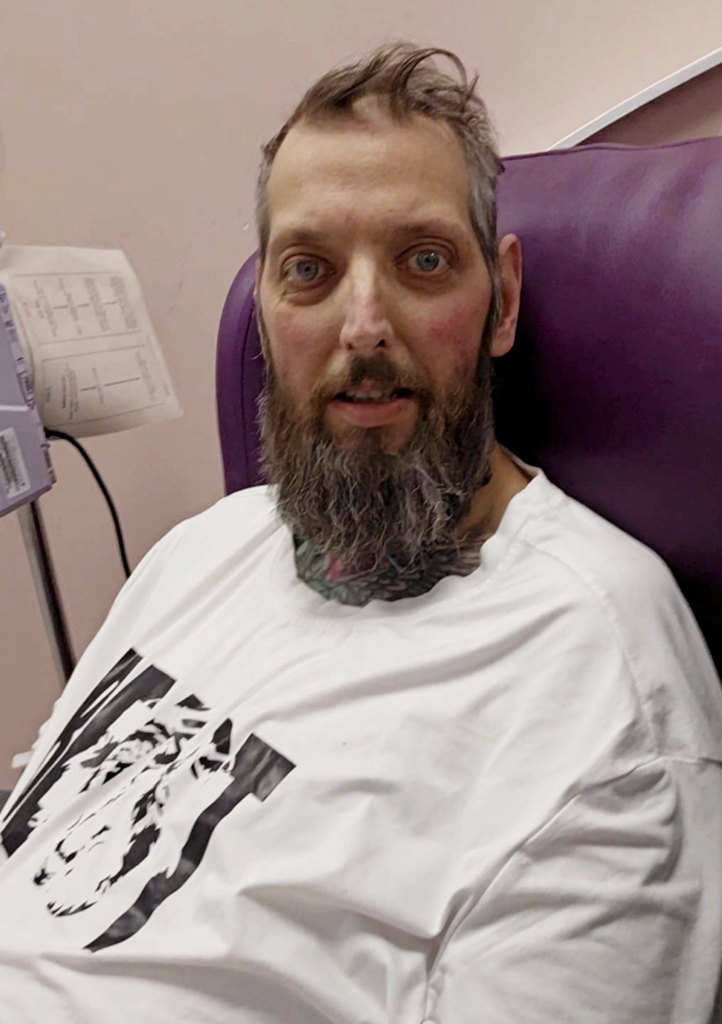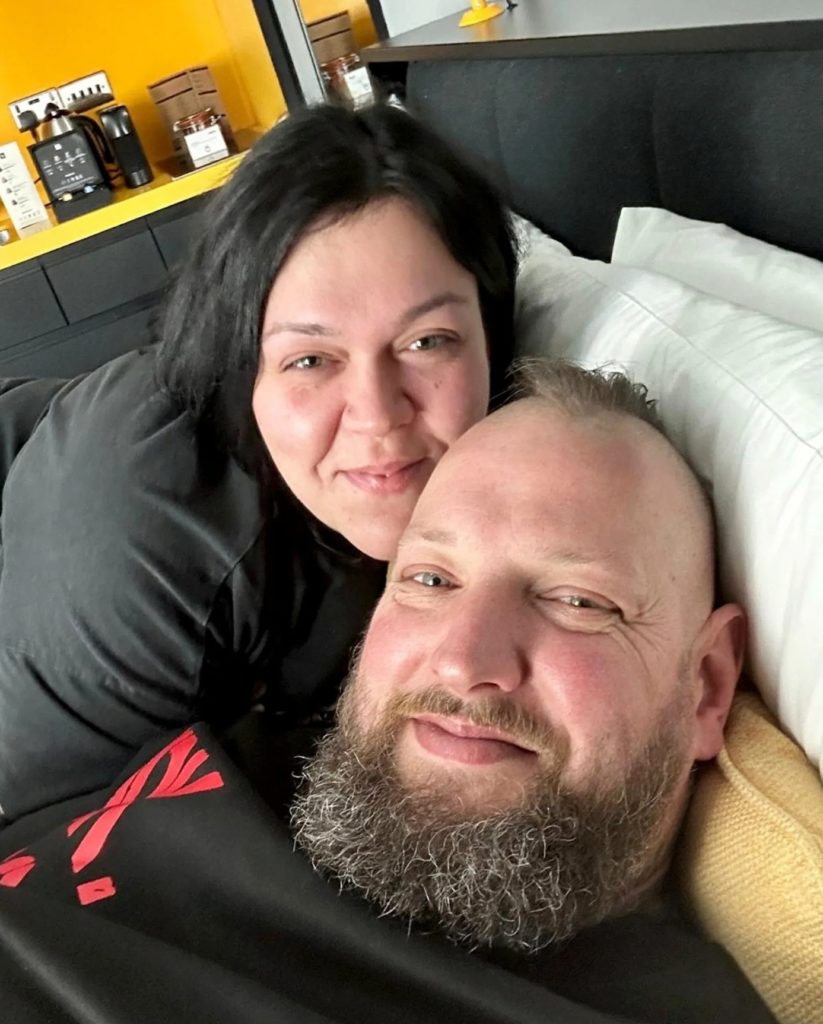Colon cancer, also known as colorectal cancer, affects the large intestine, including the colon and rectum. Early detection significantly improves treatment outcomes, but overlooked colon cancer symptoms can be subtle and easy to dismiss. In some cases, misdiagnosis or delays in medical evaluation can turn a treatable condition into a terminal one. This is the heartbreaking reality for Kev Coles, a 46-year-old father whose overlooked symptoms led to a devastating diagnosis. His story serves as a warning about the dangers of dismissing persistent health issues and highlights the importance of early detection.
The First Signs: Ignored and Misdiagnosed

Kev Coles first noticed something was wrong in July 2024. He began experiencing persistent stomach pain and digestive discomfort. He initially attributed his symptoms to minor gastrointestinal issues, but when they did not improve, he sought medical help. Doctors suspected constipation and gallstones, prescribing laxatives and pain relief. No further testing was conducted at that time.
Like many others, Kev trusted the initial diagnosis and continued with his daily life. Unfortunately, his overlooked colon cancer symptoms worsened over the following weeks. He began experiencing extreme fatigue, bloating, and irregular bowel movements. Despite these alarming signs, his concerns were repeatedly dismissed, prolonging the time it took to receive the correct diagnosis.
Alarming Symptoms Escalate

By late August 2024, Kev’s condition had significantly worsened. He was sweating excessively, feeling persistently unwell, and experiencing jaundice—a yellowing of the skin that typically signals liver issues. These symptoms could no longer be ignored, and Kev was rushed to the hospital for further evaluation.
After undergoing scans and tests, doctors discovered a large tumor measuring nine centimeters in his bowel. More devastatingly, they found that the cancer had already spread to his liver. This explained his jaundice and severe physical decline. The diagnosis was stage four bowel cancer—an advanced, life-threatening condition that offered few treatment options.
A Life-Altering Diagnosis

Receiving a stage four colon cancer diagnosis is devastating. At this stage, the cancer has spread beyond the colon, often affecting the liver, lungs, or other organs. The survival rate for patients diagnosed this late is significantly lower compared to those diagnosed in earlier stages.
Kev and his family were left reeling from the news. The cancer had been silently growing inside him, likely for years, without being detected. If it had been caught earlier, he may have had a fighting chance with surgery and targeted treatments. But by the time doctors identified the disease, it was too late for curative measures.
Read More: 20-Year-Old Woman with Incurable Colorectal Cancer Shares Early Symptoms Often Overlooked
Fighting for Time: Chemotherapy and Palliative Care

Despite the grim prognosis, Kev and his medical team decided to pursue chemotherapy in hopes of prolonging his life. In October 2024, he began treatment to slow the cancer’s spread and alleviate symptoms. Chemotherapy can sometimes shrink tumors and improve quality of life, but in advanced cases like Kev’s, it is often more about buying time rather than achieving remission.
As the weeks passed, Kev’s condition continued to deteriorate. His liver, already weakened by cancer, struggled to function properly. The chemotherapy had limited effects, and by early 2025, doctors informed him and his family that he had only weeks to live. The focus then shifted from treatment to palliative care, ensuring Kev’s comfort in his final days.
Kev’s Passing: A Heartbreaking Goodbye

On March 12, 2025, Kev Coles passed away peacefully at home, surrounded by his loved ones. His wife, Kayleigh, shared the heartbreaking news, expressing gratitude for the time they had together and the support from family and friends.
Kev’s passing left an immense void, not only in his family’s life but also in the broader community. His story had touched many, and his bravery in the face of such a devastating illness resonated with countless people. Friends, family, and supporters paid tribute to his strength, kindness, and unwavering love for his family.
Despite his illness, Kev remained positive and continued to support his loved ones until the very end. His legacy now serves as a reminder of the importance of early detection and proactive healthcare. The outpouring of love and support for his family during this time has been a testament to the impact he had on those around him.
Family’s Heartbreak and Advocacy for Awareness

Kev’s wife, Kayleigh, was devastated by his diagnosis and the rapid progression of the disease. She expressed frustration over how long it took to get a proper diagnosis. She strongly believed that if Kev’s symptoms had been taken more seriously earlier on, he might have had a better chance at survival.
As a mother and wife suddenly facing the loss of her husband, Kayleigh became an advocate for bowel cancer awareness. She urged people to listen to their bodies, push for thorough medical evaluations, and demand second opinions when necessary. Her mission was clear: to prevent other families from experiencing the same tragic fate.
Raising Awareness and Seeking Support

In the midst of their grief, Kev’s family and friends rallied together to spread awareness about bowel cancer. Kayleigh set up a GoFundMe page to help with expenses and to support their children through the difficult transition ahead. The fundraiser also served as a platform to educate people about the importance of recognizing and acting on early symptoms of colon cancer.
Their story quickly gained traction, touching the hearts of thousands who sympathized with their ordeal. Many shared their own experiences of misdiagnosis or delayed cancer detection, highlighting a widespread issue in the healthcare system.
Recognizing the Early Symptoms of Colon Cancer

Kev’s case is a stark reminder that overlooked colon cancer symptoms can be deceptive and easily mistaken for something else. While these symptoms may not always indicate cancer, they should never be ignored. If symptoms persist for more than a few weeks, medical evaluation is essential. Some of the most common early signs include:
- Persistent Changes in Bowel Habits: Diarrhea, constipation, or alternating bowel movements without an obvious cause.
- Blood in the Stool: Bright red or dark stools can indicate internal bleeding.
- Unexplained Weight Loss: Losing weight without dieting or increased exercise.
- Fatigue and Weakness: A general feeling of exhaustion that doesn’t improve with rest.
- Abdominal Pain and Cramping: Persistent discomfort that does not go away.
The Importance of Early Detection and Screening

Colon cancer is one of the most treatable cancers when caught early. In its early stages, treatment options such as surgery, targeted therapy, and radiation can be highly effective. However, the survival rate drops dramatically for those diagnosed at stage four.
Medical experts recommend regular screening for individuals over 45, especially those with a family history of colorectal cancer. Screening options include:
- Colonoscopy: The most effective test for detecting and removing polyps before they turn cancerous.
- Fecal Immunochemical Test (FIT): A non-invasive test that detects hidden blood in the stool.
- CT Colonography: A scan that provides a detailed view of the colon.
By undergoing routine screenings and being proactive about health concerns, many cases of colon cancer can be prevented or caught early enough for successful treatment.
Conclusion

Kev Coles’ story is a tragic example of how overlooked colon cancer symptoms can lead to dire consequences. His case emphasizes the necessity of listening to one’s body and pushing for thorough medical evaluations when something feels off. Colon cancer is a silent but deadly disease, and early detection is key to survival.
For those experiencing persistent digestive issues, seeking medical advice and advocating for oneself could mean the difference between life and death. Kev’s legacy now serves as a cautionary tale and a rallying cry for increased awareness, better medical responses, and proactive health monitoring. His family’s efforts in spreading awareness will hopefully save lives, ensuring that others don’t suffer the same devastating fate.

